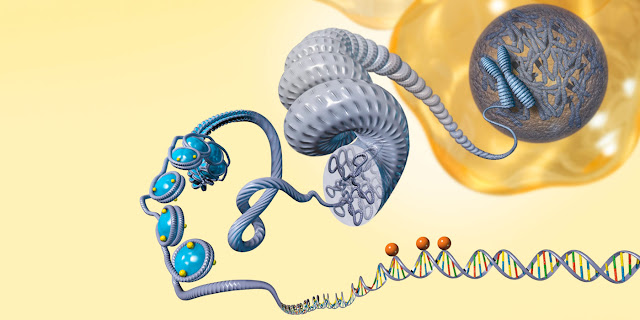Epigenetics; the Study of How Cells Control Gene Activity without Changing the DNA Sequence
Epigenetics is the study of how changes in people's behavior & environment affect the functioning of their genes. Unlike genetic changes, epigenetic changes are reversible and do not change the DNA sequence, but they can change how the body reads a DNA sequence. Epigenetic changes alter the physical structure of DNA and modify DNA without altering the genetic sequence. Epigenetic changes affect how genes are turned on and off, or expressed, and thus help regulate how cells in different parts of the body use the same genetic code.
Several
lifestyle factors might modify epigenetic patterns, such as physical
activity, diet, alcohol consumption, tobacco smoking, obesity, environmental
pollutants, working on a night shift, and psychological stress, among others.
Epigenetic modifications can be maintained from cell to cell as cells divide
and, in some cases, can be inherited through generations. Epigenetic
modifications, such as DNA methylation, can contribute to altering gene expression
in a heritable manner without affecting the underlying genomic sequences.
The
genes children inherit from their biological parents provide information that
guides their development. It means that a parent's experiences, in the form of
epigenetic tags, can be passed down to future generations. There are two types
of epigenetic modifications; DNA methylation and histone modifications. DNA
methylation occurs by the addition of a methyl (CH3) group to DNA, thereby
often modifying the function of the genes and affecting gene expression. It is
a stable epigenetic mark that can be inherited through multiple cell divisions.
Histone methylation and
histone de-methylation are epigenetic modifications that have the power to reduce
and/or bolster gene expression, especially as a result of altering chromatin
structure. In recent times, Epigenetics
Market diagnostics have
emerged as an effective measure for the treatment of chronic diseases such as
cancer. The Max Planck Institute of Immunobiology and Epigenetics in Freiburg
(Germany) is an interdisciplinary research institution that conducts basic
research in two key areas of modern biology.
Watch video Epigenetics : https://lumen5.com/user/poonam-165/epigenetics-market-fh6dy/




Comments
Post a Comment